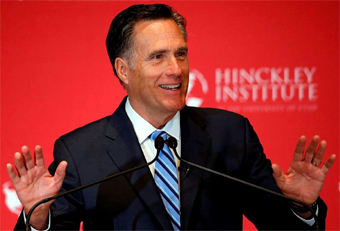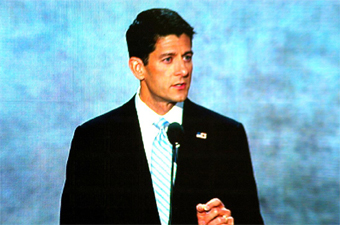
Image courtesy of University of Utah
Mitt Romney Offers Blistering Repudiation of Donald Trump
| published March 3, 2016 |
By R. Alan Clanton, Thursday Review editor
Mitt Romney, speaking from the University of Utah’s Hinckley Institute of Politics and Public Service, called upon conservatives and Republicans to disavow Donald Trump and to choose a nominee instead from among Trump’s rivals. Romney’s comments came as a direct and blistering attack on Trump, now the GOP’s undisputed front-runner after the billionaire racked up major wins across the map on Super Tuesday. Trump won all states except for four—three of which went to Texas Senator Ted Cruz, and one of which went for Florida Senator Marco Rubio.
Romney’s assault on Trump Tower comes as open panic and rebellion sweep the Republican Party in the face of what may soon be an inevitable Trump as GOP nominee. With Trump’s rivals deeply divided, the businessman and real estate tycoon looks mathematically unstoppable despite the considerable firepower now being thrown against him.
Romney, in a brief but scathing repudiation of Donald trump, says that Trump may become the ruin of a great political party, and could damage the United States as nation in the 21st century.
“Let me put it plainly,” Romney declared in his Thursday speech, “if we Republicans choose Donald Trump as our nominee, the prospects for a safe and prosperous future are greatly diminished.” Romney, who was the Republican candidate for President in 2012, characterized Trump as a “phony” and a “con man,” and suggested that not only will Trump not release his most recent tax returns to public scrutiny, but that Trump will “never” make his tax and income record public because he has made too many false claims about his businesses and his finances.
Romney also commented on Trump’s many failed business ventures and frequent bankruptcies as evidence that Trump is not the business success story he frequently portrays himself as, and suggested that Trump has as much to hide in his business practices as he often vaguely discloses or occasionally brags. Romney cited Trump’s many failures: Trump University, Trump Airlines, Trump Vodka, Trump Steaks and Trump Steakhouses as examples of someone who operates impulsively and ill-informed in the field of business.
“A business genius, he is not,” Romney said.
Romney also questioned why Trump should deserve the Presidency when he has shown voters only a penchant for bullying, bellicose and unguarded language, and a deliberately dismissive tone when he is questioned about his past flip-flops on key issues, and his often outrageous statements and unhinged tirades.
“I am far from the first to conclude that Donald Trump lacks the temperament of be president,” Romney said. “After all, this is an individual who mocked a disabled reporter, who attributed a reporter’s questions to her menstrual cycle, who mocked a brilliant rival who happened to be a woman due to her appearance, who bragged about his marital affairs, and who laces his public speeches with vulgarity.”
Romney also pointed out that Trump’s bullying knows no boundaries and operates with little relation to the facts or the realities of history.
“Donald Trump says he admires Vladimir Putin,” Romney said, “even while he calls George W. Bush a liar. That is a twisted example of evil trumping good. And there is a dark irony in his boasts of his sexual exploits during the Vietnam War, while John McCain, whom he has mocked, was imprisoned and tortured.”
“Dishonesty is Trump’s hallmark,” Romney went on to say. “He claimed that he had spoken clearly and boldly against going to war in Iraq. Wrong—he spoke in favor of invading Iraq. He said he saw thousands of Muslims in New Jersey celebrating 9/11. Wrong—he saw no such thing. He imagined it.”
A Trump nomination will very likely guarantee a Clinton victory in November, Romney said.
“Trump relishes any poll that reflects what he thinks of himself,” Romney declared, “But polls are also saying that he will lose to Hillary Clinton.
Romney again predicted that there are bombshells among Trump’s tax returns. Romney said Trump can at any time release those much-discussed tax returns currently being audited, but Romney also predicted that Trump has too much to hide, and will not likely ever release full tax returns, in large part because many of Trump’s much-ballyhooed claims—that he donates large sums of money to veterans groups and organizations which support disabled people—are patently false. Romney confidently predicted that no matter the media pressure, Trump will “never” release any tax returns, adding “he has too much to hide.”
Trump’s refusal to release any tax returns will, Romney said, confirm that Trump is a phony and a liar.
Calling Trump’s bellicose behavior a fraud, Romney added “his promises are as worthless as a degree from Trump University. He’s playing the American public for suckers. He gets a free ride to the White House and all we get is a lousy hat.”
Romney conceded that Americans are feeling anger and frustration on a scale rarely seen in American history, but suggested that Trump is converting that anger for the less-than-noble purposes. Romney cited Trump’s frequent verbal attacks on Muslims, foreigners and especially immigrants from Mexico, his endorsements of the use of torture, his refusals to repudiate a well-known KKK leader, and his frequent assaults on the Bill of Rights and the Constitution as proof that Trump is a dangerous and immoral exploiter of fears and apprehensions.
Romney’s speech sparked immediate debate in the mainstream media and spawned thousands of comments on Facebook, Twitter and other social media. Trump supporters called into question the relevance of Romney’s remarks, and many of those who might otherwise oppose Trump worried that the speech—while powerful and eloquent—may be more wasted ordnance on the candidate already marching toward the nomination. A few analysts suggested that Romney’s speech comes six weeks late, and that any effective counter measures against the billionaire Trump should have been launched no later than early January.
Romney’s address comes at a time when many GOP officials are now scrambling frantically to craft a push back against Trump’s now gathering momentum nationally. In Washington, many members of the GOP on Capitol Hill have openly repudiated Trump, and still many more “establishment” Republicans says that the only way to defeat Trump now is all out war, as well as a coordinated assault by all remaining candidates in the GOP field.
David Goodfriend, a Democratic strategist, called the epic battle unfolding within the GOP as “Predator Versus Alien,” and said that wealthy conservative interest groups—such as the Koch Brothers—set this nasty war in motion. Other Democratic strategists worry that Trump’s scorched-Earth campaign could, at some future point, attract centrist, moderate, and independent-minded Democrats because of Trump’s openly populist appeal. As for the complaint that conservative groups brought this on by fanning the flames of intolerance and anger, many of those retort that nothing in those political movements could have indicated an invitation for Trump to engage in the language and narrative now at play.
Some within the GOP admit that they never saw this scenario coming, and now express bitterness that party leaders, particularly top RNC officials, did not act sooner to mitigate the circumstances wrought by a field deeply overcrowded beginning as early as the fall of 2014. By Early in 2015, there were some 17 Republican candidates running for President—a potentially unmanageable number by any stretch, and a recipe for an outsider to channel frustration and anger into a rapid series of “wins” in debates and public forums.
Romney’s scathing speech was met, predictably, by a rapid retort from Trump. By mid-afternoon Trump had unleashed a barrage of counter-attacks.
Speaking at a rally in Portland, Maine about an hour after Romney’s speech, Trump called Romney a “failed candidate” and said that Romney had “begged” for the endorsement of the real estate billionaire.
“I could have said to him ‘Mitt, drop to your knees,’” Trump declared to the audience, “he was begging me.”
Throughout the Portland speech, Trump also referred to Romney as a political failure and a “choke artist,” and suggested that he should thank former Florida Governor Jeb Bush for talking Romney out of considering a 2016 bid.
“Can you imagine…Jeb? Jeb sold him,” Trump said. “Jeb’s a high-energy salesman.”
Trump also described Romney’s speech as “nasty,” and added that Romney does not now—nor did he have in the past—the right stuff to be President.

Photo by Alan Clanton/Thursday Review
Romney’s speech was not the only major broadside aimed at Trump on Thursday. At least a dozen major GOP officials in Washington and in several state capitals expressed outrage at Trump’s theatrics, and asked that Republican voters abandon efforts to propel the billionaire into the White House. Sniping has erupted as well between GOP leaders on Capitol Hill, including a Wednesday dust-up between Trump and Speaker of the House Paul Ryan, who was Romney’s running mate in 2012. Ryan said that Trump had not offered a clear enough and unequivocal repudiation of KKK leader David Duke, which resulted in what amounted to an outright threat by Trump, who said Ryan “will pay a big price” for non-cooperation.
The Los Angeles Times also took aim at Trump with a scathing editorial, calling him a “bombastic billionaire” and declaring that he “has no experience whatsoever in government, interacting with the machinery of state only as a supplicant. He has shamefully little knowledge of the issues facing the country and the world, and a temperament utterly unsuited to the job.”
The LA Times editorial blasted Trump for his frequent outrageous and eye-opening proposals, such as his calls to kill families and civilian friends of known terrorists, for banning the entry of Muslims into the U.S., for his threats of trade wars with other countries, his frequent threats of lawsuits against his political opponents whose only “crimes” are running TV ads using Trump’s own videotaped words, and for his threats to rewrite the first amendment of the constitution to enable lawsuits against news organizations for writing “hit pieces” and investigative articles into his business practices.
Meanwhile, the fight may get nastier between the GOP regulars and Trump and his supporters. Cruz this week has asked that other candidates consider removing themselves from the race, suggesting that they instead channel their support and the energy of their backers toward his candidacy. Cruz cites his multiple wins in several states as evidence that he alone has the chops and skill to best Trump before a Trump nomination becomes a mathematical certainty. Rubio, however, says he intends to fight on, and has set Florida’s March 15 primary as his Alamo. Rubio remains well-funded and his own strategists say he intends to soldier on for the foreseeable future. Kasich, likewise, sees opportunities in the states ahead, including in his home state of Ohio. But such optimistic visions could prove to be shimmering oases. Example: Rubio currently trails Trump by 14-to-22 points in the Sunshine State.
One thing is certain: the anti-Trump candidates now face a very firm deadline. Most analysts suggest that a failure to halt Trump’s rise by the end of March means almost a mathematical certainty that he will win the nomination, especially as the proportional delegate distribution gives way to states where the winner takes all the delegates.
Related Thursday Review articles:
Trump and Clinton Score Huge Wins on Super Tuesday; R. Alan Clanton; Thursday Review; March 2, 2016.
Rubio’s Eleventh Hour War on Trump; R. Alan Clanton; Thursday Review; February 27, 2016.
